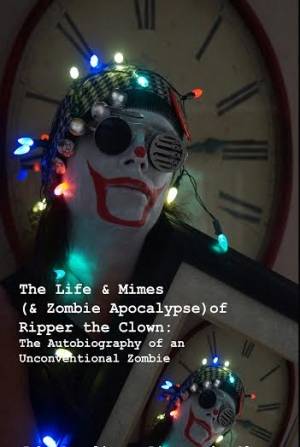Whether they’re in your video games, on movie screens, or on your bookshelf, zombies have become especially prevalent in entertainment and popular culture in recent years. Unfortunately, creative thought has not kept up with this explosion of the genre, and many zombie storylines end up being redundant and monotonous. But author Jake Aurelian and his alter-ego Ripper the Clown are able to take an ingeniously unconventional approach to the zombie genre in their newest novel, The Life & Mimes (& Zombie Apocalypse) of Ripper the Clown: The Autobiography of an Unconventional Zombie.
While traditional popular culture zombies have taken on the role of unintelligent, unintelligible rotting corpses with no aspirations beyond devouring human flesh, The Life & Mimes (& Zombie Apocalypse) dispels this stereotype, enabling its story of a zombie apocalypse to be told from the perspective of a zombie. Unlike its predecessors, The Life & Mimes… introduces zombies with full mental capabilities, minimal cannibalistic tendencies and (almost) no slow, stunted saunter in sight.
 I recently got to sit down and talk with Aurelian, and he mentioned how, during some of his comedy sets, the audience wouldn’t laugh for the first 90 percent of the show but would be hysterical for the remaining ten percent of it. His explanation for this was that during those particular sets, all of his jokes would tie together at the very end. Unbeknownst to his audience until the finish, the individual punchlines actually serve as the set-up for the last, all-encompassing punchline. In reviewing Aurelian’s book, I think maybe something similar happened to me, and I just had to delve further into the story to realize how Ripper’s distinct writing style all ties together throughout the novel to make it even more enjoyable.
I recently got to sit down and talk with Aurelian, and he mentioned how, during some of his comedy sets, the audience wouldn’t laugh for the first 90 percent of the show but would be hysterical for the remaining ten percent of it. His explanation for this was that during those particular sets, all of his jokes would tie together at the very end. Unbeknownst to his audience until the finish, the individual punchlines actually serve as the set-up for the last, all-encompassing punchline. In reviewing Aurelian’s book, I think maybe something similar happened to me, and I just had to delve further into the story to realize how Ripper’s distinct writing style all ties together throughout the novel to make it even more enjoyable.
This was definitely the case for a complaint I initially had, that being that there is some seriously unrealistic shit that goes down in this book. But that’s fine — it is fiction, after all, and unrealistic things are supposed to happen, right? Well, kind of. It’s always interesting to recognize that, when something is fully unrealistic (like walking, talking trees in The Lord of the Rings), the mind simply accepts it as truth and doesn’t question it. But when something is just realistic enough (i.e. killing a person) but has a touch of unrealism added to it (ditching the said murdered person for an eBay auction), the mind begins to demand some closure on the matter. This is exactly what happened to me. I didn’t question the resurrection of the dead, but I did freak out when Ripper killed Frank Cranks by running him over with his car and then chose to go home without doing anything about the body because there was “probably” some item ending soon on eBay. At first I rolled my eyes, criticizing the book for being too impractical. But soon enough I realized how hilarious that incident was precisely because of its complete lack of realism (although I was also forced to momentarily question my own morality for laughing at the murder of a human being, albeit a nasty one like Frank Cranks).
Aurelian is also incredibly successful at causing his readers to suspend their disbelief, as he incorporates real life events, locations, and people (his own alter-ego included) and fictionalizes them just enough so that you’re left wondering whether you’re reading fiction or truth. This was one of the first striking features of Aurelian’s writing that I noticed, and it’s probably still one of my favorites. Ripper’s breaking down of the fourth wall complements this aspect of the novel as well. Aurelian also does an excellent job at ensuring that the book does not fall victim to being too predictable, as well as keeping the reader constantly intrigued. Naturally, coming from the perspective of a clown comedian, the tone of the narrative is incredibly casual throughout most of the book. But this is mixed with times when the story takes on an unexpectedly serious and foreboding tone or addresses a morally unsettling issue. Likewise, Aurelian is able to elicit both amusement and sympathy from his readers. When the humans in the novel mercilessly murder hundreds of zombies for mere fun, I found myself seriously questioning the morality of the human race, but an instant later I was somehow back to laughing at the same issue. I promise I’m not a horrible person — Aurelian just does an ingenious job of making serious things hilarious, and vice versa!

Another one of his many humorous and clever mechanisms is Ripper’s alluding to Aurelian’s other novels. Viewing this simply as Aurelian capitalizing on an opportunity to promote his other works, this may or may not seem tacky to some readers. But the subtlety with which Ripper the Clown employs this saves it from being exclusively beneficial to the writer and thus also from being tasteless. As Aurelian’s name is never mentioned in association with the alluded-to titles, readers who aren’t already familiar with his other works would likely just skim past them, not attributing any particular significance to them. Similarly, one chapter of The Life & Mimes… is actually copied verbatim from another one of Aurelian’s novels, We Leave with Our Guns Out! But once again, unless you’ve read his aforementioned piece, there’s no way you’d recognize that Aurelian is pulling from one of his own past works. This recycled section of the book actually delivers an even bigger twist to the novel, but I won’t go any further into it, as it was one of my favorite parts of the book and I don’t want to ruin it for others.
All in all, The Life & Mimes (& Zombie Apocalypse) of Ripper the Clown wasn’t just a book for me but an experience, and one unlike any other that I’ve had before. It was so different from anything else I’ve read—in more than one respect—and I appreciated the risks that Aurelian was willing to take enormously. It is undoubtedly a book that requires an open mind from its readers, but if you are prepared to provide such, it is definitely a rewarding read.
Ripper the Clown photo credit: Jake Aurelian and Della Perrone.








